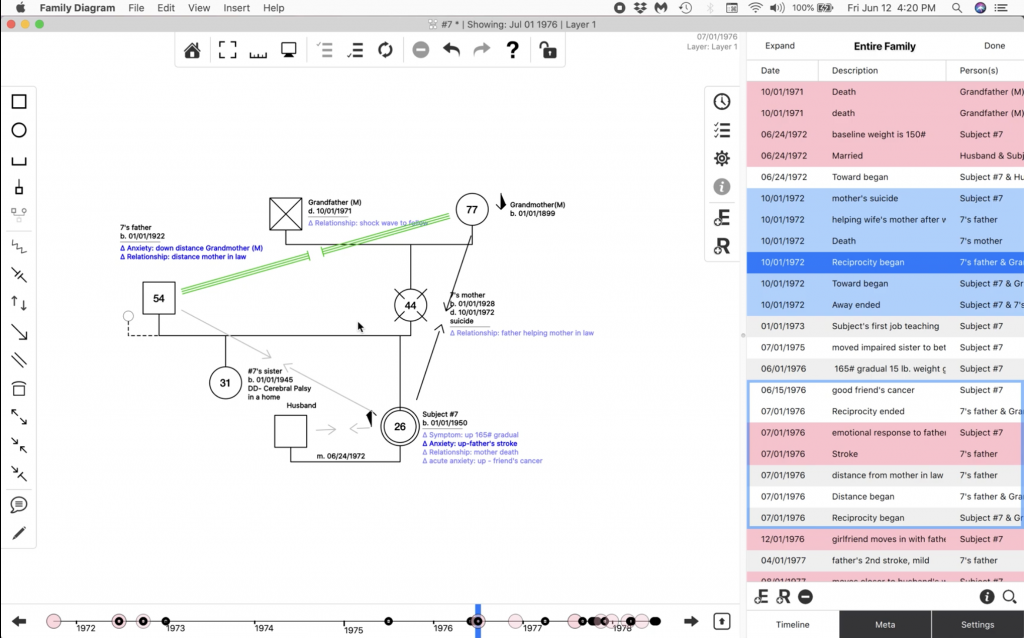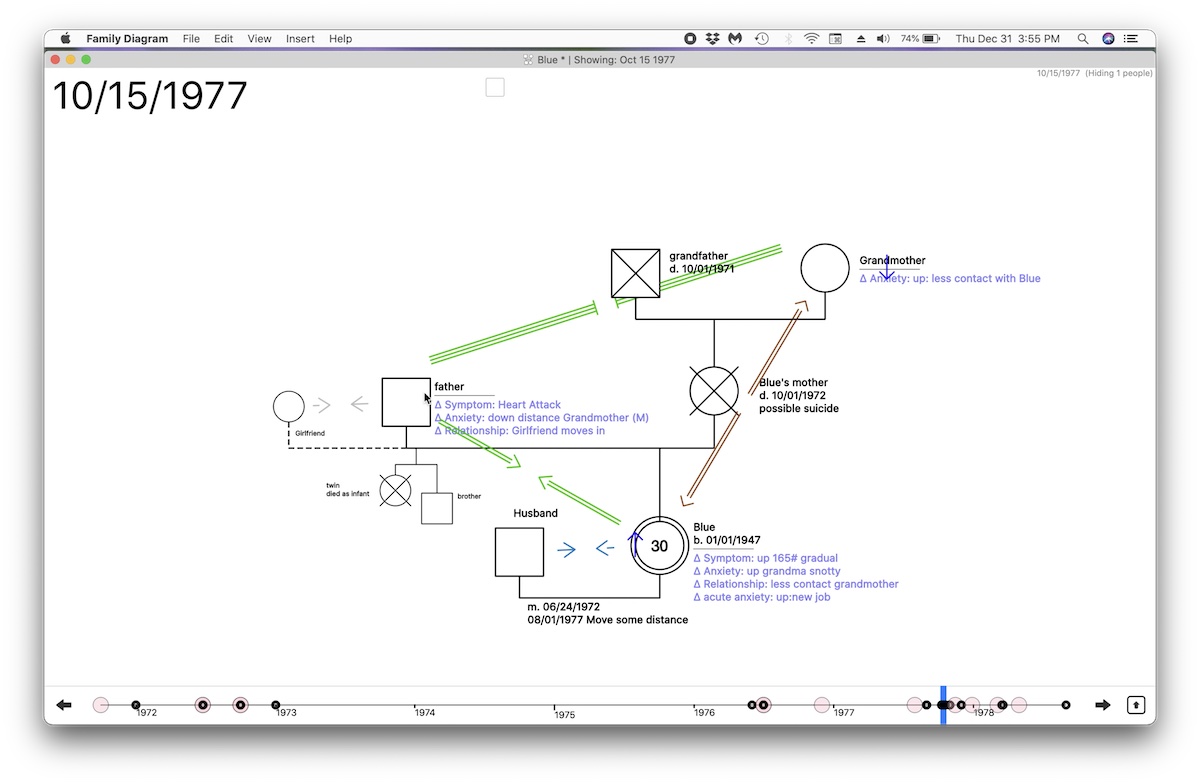Test what you think you know about Bowen theory
The Family Diagram app seminar is an opportunity to people interested in family emotional process to approach the topic in a more explicit way than previously possible. The aim of the seminar is to push the state of the art for testing hypotheses about the role of family in individual functioning, and vice-versa. Participants learn by presenting their own efforts to the author of the app and other participants.
The seminar follows from the belief that there is predictability amidst the complexity of family emotional process, and that this predictability is only waiting to be seen through the systematic organization of old information in new ways. The app itself is only one effort to innovate a way that information about family emotional process is explicitly managed. Thus, participants are encouraged to bring new thinking and innovations for studying the family as a biological unit more systematically with or without the app.
Because the app formalizes the essentials of data collection on emotional process for the first time, it exposes flaws in assumptions and definitions quite rapidly. Experience shows that it can take up to a year in the seminar to discover precisely that this is so. At this point the actual work to be done becomes clear. Therefore, the seminar is aimed at honing basic skills of mainstream, accepted scientific research within this new context.
Seminar Format and Schedule
The seminar schedule consists of five two-hour meetings and three one-hour meetings, and runs from October to May. All meetings are on Fridays. The longer meetings are from 2-4pm Eastern time on a Friday, and consist of a presentation by Dr. Stinson followed by a presentation by a participant who signed up for that slot at the beginning of the year. The one-hour meetings allow for a more open format, for example for up to three participants to present short topics. The agenda for short meetings is set by email or in the beginning of that meeting.
NOTE: There is not enough time to provide tech support in the meeting. Participants are therefore responsible for their own tech support during the meeting. This includes ensuring that the app is functioning, that they can access the appropriate diagrams prior to the meeting, and that they are able to show the app over Zoom screen share without assistance.
Dr. Stinson’s Presentations
The goal of Dr. Stinson’s presentations is to stimulate thinking about the application of both systems thinking in research and the 8 concepts of Bowen Theory. New app features and/or developments that bring academic substance may be discussed from time to time. Regardless of topic, emphasis will always bias toward the academic as opposed to the technical.
Participant Presentations
Presentations are an important tool for clarifying one’s own thinking and gaining access to the thinking of others. All participants are expected to sign up to present in one of the two-hour meetings each year. Each presentation is followed by a facilitated discussion. These presentations are an opportunity for a deeper dive into their work.
This process will likely raise questions and thinking about how to better organize a systematic approach to the problem at hand as well as how to use the app itself.
NOTE: There is not enough time during the seminar meetings for tutorial-style instruction on how to use the app. Therefore, participants are expected to learn to use the app outside the seminar using the published learning materials and support channels.
Participant Consultation
Each participant in the seminar receives two private, one hour, individual consultation sessions from Dr. Stinson. These sessions can cover whatever topics are most useful for the participant, including technical how-to questions.
NOTE: To make the most of their individual consultation sessions, participants are encouraged to make use of the free email support available to the public. This will avoid the common pattern where participants wait much of the term before addressing one or two straightforward technical questions that can unblock their work.
Prerequisites for Application
The following are the basic requirements for application:
- An active and defined professional or research project that makes use of the app in some way. This can include:
- Research projects that use a falsifiable data or predictive model, including inter-rater reliability and other qualitative methodologies.
- Projects aimed at peer-reviewed publication in scientific journals or databases, including those conducted by graduate students.
- The application of Bowen Theory in some professional practice (see NOTE 4 below)
- Ideas for projects can be found here: Roadmap of Collective Research Projects
- Access to the Family Diagram app on Windows or MacOS
NOTE 1: Training in Bowen theory is not technically required to enter the app seminar, as a falsifiable project using the app serves as an appropriate boundary condition that training in theory provides for other seminars.
NOTE 2: Applicants who are interested in research but do not want to design their own project may choose a project idea from one of the following two pages, and may consult with Dr. Stinson on a research design:
- Prerequisite Hypotheses for Research in Bowen theory
- Example Falsifiable Hypotheses for Research in Bowen Theory (a work in progress)
NOTE 3: Applicants may change their project during the seminar, but some project with falsifiable analysis is necessary to structure the effort. It is not necessary to complete the project during the seminar. Click here for instructions on the format for submitting the project definition
NOTE 4: Applicants whose project is using the app in professional practice do not need to submit this effort as a formal research project. Instead they will demonstrate that they are able to test falsifiable predictions in their their work – no matter how small or simple. This reflects the standards for “science based practice” in medicine. Applicants will provide a small falsifiable prediction from a real case, adapted to fit into the format for submitting formal research proposals. This prediction will include past observations from the case used to inform the prediction, (retrospectively) articulating what the prediction was before the outcome was observed, then a description of whether the prediction as falsified or not. As this scientific standard remains uncommon in professional behavioral health practice, Dr. Stinson will volunteer the same research advisor time to any applicant who strives to reach this standard in their application.
Required Reading Materials
For All Seminar Participants
The following two articles emerged out of Dr. Stinson’s presentations in the seminar, and are now required reading for all participants:
Though much can be learned in the seminar about how to use the app, the seminar itself does not involve classroom-style tutorials. Participants are instead expected to make the effort to learn how to use the app outside the seminar. Comprehensive tutorial-style learning is freely available through the following “required reading” materials:
- Family Diagram User Manual, also accessible from the “Help” menu of the app.
- The Official Family Diagram Video Tutorial, also accessible throughout the User Manual.
- The individual technical support channel for the app.
Just as with non-seminar participants, individual consultation sessions for using the app are available at an hourly rate. Information for this can be found on the support page.
For New Students of Bowen Theory
New students of Bowen Theory may refer to The Annotated Bibliography for New Students of Bowen Theory as a guide to choosing a starting point for reading about Bowen Theory. The following are seminal publications on Bowen theory:
- Family Therapy in Clinical Practice, Murray Bowen, 1978
- Family Evaluation, Michael Kerr, 1988 (Particularly Chapter 10 on Family Assessment)
- The Family Systems Journal
- Alaska Family Systems news and articles.
- It is recommended you subscribe to updates for the website to stay current on new conceptual developments and app features.
Information about formal training in Bowen Theory can be found on the Training page at the Bowen Center’s website.
Information about other programs in the International Bowen Network can be found on the Bowen Programs Elsewhere page of the Bowen Center website.
Cost of Attendance
The fee for the year is $300. This fee serves the following functions, in order:
- To be cause for personal investment in each participant
- To support a portion of the time required to organize and facilitate the seminar (The remainder is volunteered)
- To support a portion of the time for individual consultation by Dr. Stinson (The remainder is volunteered)
A spot is secured in the seminar upon full payment of the fee, with two exceptions:
- Scholarships are available upon the negotiation of a contribution to testing the app and/or development of its concepts.
- Free full app licenses are also available for those who submit a research proposal and agreement to publish on AFS.
Application Form
Those interested in participating in the seminar will fill out the following application. You will be contacted directly via email regarding your submission and information for payment of the participation fee. Past participants do not need to re-apply unless requested to do so. Past participants are more than welcome to submit a new project proposal for their own learning if they choose.
Please note that the “Statement of Commitment” section in the proposal format link is not required when applying for the app seminar. The goal for including a research project description document in the seminar application is merely to 1) ensure that each participant has a structure to organize their effort in the seminar, and 2) that the plan includes developing proficiency using the app prior to the seminar meetings. For this to work, one’s thinking about the effort at hand must be sufficiently clarified. A standard research proposal/definition has proved an ideal format for this.
If an applicant is looking for hypotheses to apply with, they can refer to this page: Example Falsifiable Hypotheses for Research in Bowen Theory
Applicants are as eligible as anyone to receive a free one-year professional app license by completing the research project definition, as outlined in the instructions on the linked post. This simply amounts to adding a “Statement of Commitment” section to receive the free one-year app license and then also to complete the project as agreed in that statement of commitment.
NOTE: It is expected that the majority of applicants will require some advising by Dr. Stinson to complete the document describing the research project. The application itself is intended to be an exercise at clarifying one’s thinking. The most difficult part for many is defining a hypothesis that is actually falsifiable, as this practice does not exist in the status quo in research under Bowen Theory. Dr. Stinson will volunteer his time over email as a research supervisor during the application process so far as an applicant’s attention will allow. Therefore, do not be afraid to make mistakes in your initial submission. Submit the best project description you can according to the instructions and example, and expect feedback. This is a skill to be learned – returning applicants are less likely to require corrections.




